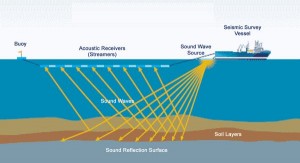
The Obama administration has taken a stand with energy developers and approved the use of underwater sound waves to uncover new oil and gas deposits in federal waters off the Atlantic coast.
This regulatory decision is seen as a first step in what many believe can be a huge boost to the economies of states along the Atlantic coast. If oil exploration results in oil discovery and development there is a huge potential of a corresponding development of all supporting industries, creating thousands of jobs which ultimately bring in billions of dollars in tax money.
The regulation that allows for sound blasts to search for oil deposits has left environmentalists and others less happy.
People whose incomes are dependent on the sea, such as those in the tourism industry and fisheries, are concerned about their livelihood, while environmentalists say that this move puts a stain on President Obama’s environmental legacy.
“Opening vast stretches off the East Coast to oil and gas has no place in an otherwise historic agenda to combat climate change,” said Michael Jasny, a marine mammal expert with the Natural Resources Defense Council.
Future development however is not the only concern. The method of exploration itself is a source of pollution- noise pollution. The sound waves will be produced and released by cannons in Gulf Stream waters where whales, dolphins and turtles live. The sounds will be produced every ten seconds for weeks at a time. The US Bureau of Ocean Energy Management admits that many ocean-dwelling animals will suffer. Nevertheless they decided to give their stamp of approval to the search for oil in this way, from Delaware south to Florida. Energy companies say they need the information now so they can use the data to apply for drilling leases for 2018, when the present congressional limits end.
“The bureau’s decision reflects a carefully analyzed and balanced approach that will allow us to increase our understanding of potential offshore resources while protecting the human, marine, and coastal environments,” acting BOEM Director Walter Cruickshank said.



